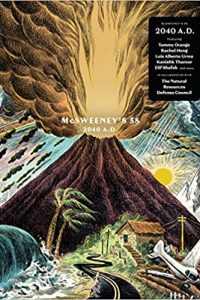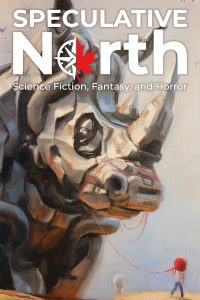Paul Di Filippo Reviews Lessons in Birdwatching by Honey Watson
 Lessons in Birdwatching, Honey Watson (Angry Robot 978-1915202536, trade paperback, 312pp, $17.99) August 2023
Lessons in Birdwatching, Honey Watson (Angry Robot 978-1915202536, trade paperback, 312pp, $17.99) August 2023
In what appears to be her flying-out-of-the-gate debut novel, Honey Watson has essentially taken the territory that C. J. Cherryh staked out so brilliantly—humans and aliens communicating and miscommunicating across exotic scrims of politesse—and imbued it with New Weird stylings and gonzo action sequences to create something truly fresh and arresting. So if you anticipate that Lessons in Birdwatching will read more or less like a fusion of Cherryh, Robert Jackson Bennett, and Cody Goodfellow, you will not have gone far astray.
In addition to her strikingly mashed-up ideations, Watson also presents us with a distinctive style—favoring narrator asides, deadpan dialogue, and intrusive insights from other planes of reality—which burnishes and embodies the otherness of her tale. It’s always refreshing when authors do not neglect the power of creatively torqued language.
Our tale is a kind of space opera, I suppose, although it is limited to the surface of a single planet, Apech—and specifically to two venues thereon: the contortedly grotesque city of Lon Apech, and the rural coastal town of Ech Kon. What slots it into the space opera genre is the offstage conceit: a multisystem empire named Crysth is consolidating all other cultures outside itself, absorbing them into the empire if they feature valuable resources.
A few hundred years before this montage of humanity would come to occupy their pagoda, the Red faction of Crysth’s government had concluded the centuries long Data War with waves of destruction which ruptured the empire into four symbiotic sections, each of them with its own imperial figurehead: Red, Military, Green, Ethicist. It works.
All forms of private transport had been forbidden since the war. As a result, none of the planets under Crysth’s control could be reached by individuals not affiliated with or permitted by the transport ministry – a sprawling and irretraceable sector which had come to dominate the flow not only of people but of information over long distances. All of it strictly centralized. Nobody who knows how the systems work is allowed out of the central palaces unwatched. They are mutilated as reward for their skill, fitted with a prosthetic jaw which allows them to communicate directly with the machines they command.
A little oddball Instrumentality flavor here.
Apech is currently being surveyed for admission, and there is just a handful of Crysth representatives around: Ambassador Gris Caralla, and her loyal assistant, Agnes (a man, BTW, with a name deliberately surreal to our ears). And five cultural experts, the residents of that aforementioned pagoda: Ming, Peter, Ar, Jasef and Achira. By her focus on a team of five distinct individuals (Ar being nonhumanly variant), Watson is able to present many different stances on the project, and also indulge in some excellent caustic dialogue that derives from David Mamet via his chief exponent, Brian Michael Bendis and Bendis’s influence on the MCU. When we first encounter them, Ming and Peter are lovers, and this relationship will attain ironic dimensions when they find themselves on opposite sides of the gameboard.
The native culture of Apech is harsh and opaque one, featuring public executions and a caste of indigent disabled victims.
[The] tama. A woman with a broken mind. The word means cursed, ruined, sacrosanct. They are the last physical evidence of whatever it was that had brought the Crysthian scouting party’s magical compass shuddering towards Apech decades ago. It used to be that Apechi lost half their children to it – a creeping ailment which leaves a prepubescent either with altered vision or an altered intellect. Now it claims fewer and fewer as the magic weakens or dies. But it isn’t gone, and Crysth is naturally suspicious of anything unnatural; a result of “having spent centuries encountering the horrors of the unknown universe. They will not allow Apech into their fold until they know what it is. Was.
As the survey of the planet deepens—the natives both resisting and cooperating by turns—it eventuates that the origin of the tama and of other phenomena resides in an actual rogue deity, restirring from its slumbers, aided by a certain faction of the natives. Once this creature—portrayed by Watson as a font of biohorror—comes fully online, the whole planet—and maybe the Crysth Empire itself—appears doomed. The balance will be determined in the short, nasty small war that concludes our tale—leaving an opening towards a sequel.
Watson is a dab hand at action sequences, but even in the middle of a suspenseful run, she pauses for black comedy.
[Jasef says,] “Will you signal that damned ship? We are being relied on.”
“If you’d shut up then yeah,” Peter replied, maneuvering himself back underneath the desk.
Jasef sighed, sat himself back in Agnes’ chair to watch.
“Got it,” said Peter, pulling himself upright.
“Was that it?”
“What did you expect?”
“I don’t know, it to take a while. What did you actually have to do?”
“Type in a sequence.”
“Show me.”
“No. It’s Military stuff.”
“Oh, come on.”
“No.”
“You don’t want me to see because it’s just a button isn’t it.”
“No!”
“Then show me.”
Peter paused, hands resting on his thighs. “Alright it’s just a button.”
“Ha!”
“Shut up. I called Ming too. We need to go watch the elevator.”
Rigorously yet flexibly maintaining this blend of outré M. John Harrison postmodernism with an almost Leigh-Brackett-Planet-Stories vibe, Watson pushes the frontiers of space opera a little further into the hitherto-unseen void.
 While you are here, please take a moment to support Locus with a one-time or recurring donation. We rely on reader donations to keep the magazine and site going, and would like to keep the site paywall free, but WE NEED YOUR FINANCIAL SUPPORT to continue quality coverage of the science fiction and fantasy field.
While you are here, please take a moment to support Locus with a one-time or recurring donation. We rely on reader donations to keep the magazine and site going, and would like to keep the site paywall free, but WE NEED YOUR FINANCIAL SUPPORT to continue quality coverage of the science fiction and fantasy field.
©Locus Magazine. Copyrighted material may not be republished without permission of LSFF.






